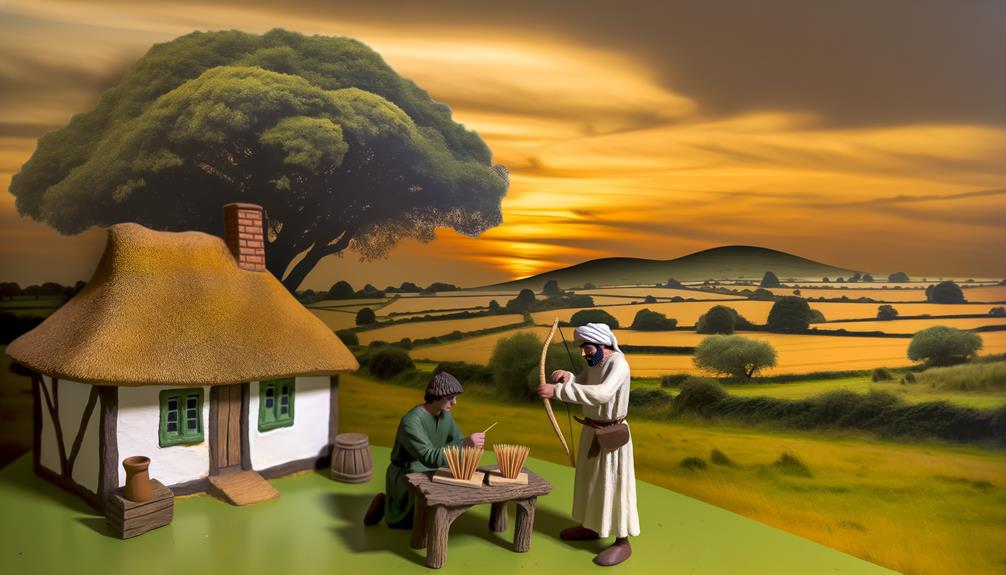Fletcher Name Meaning and Origin
The surname Fletcher derives from the Old French term **'flechier,' meaning 'arrow maker.' It emerged post-Norman Conquest, reflecting the professional role within medieval society. Historically, it was common in English regions where archery thrived, such as Yorkshire and Lincolnshire.
The name symbolizes a heritage of craftsmanship, linked to socio-economic changes over centuries. Over time, Fletcher evolved into a given name, epitomizing admiration for historical expertise.
Today, it is prevalent globally due to migration, with notable distribution in the United States, Canada, and Australia**. Prominent Fletchers have impacted diverse fields, enriching the name's resonance.
Explore further for details on this unique name's legacy.

Key Takeaways
- "Fletcher" originates from the Old French word 'flechier', meaning 'arrow maker'.
- The name reflects an occupational heritage linked to traditional craftsmanship in archery.
- It became prominent in England and Scotland, especially in regions associated with archery.
- Migration spread the surname globally, with notable concentrations in the UK, US, Canada, and Australia.
- The name maintains cultural relevance through appearances in literature, film, and historical records.
Historical Background
Deriving from the Old French word 'flechier,' the surname Fletcher historically signified an individual who crafted and sold arrows. This occupation was critical during medieval times when archery was an essential skill for both hunting and warfare.
Fletchers played a pivotal role in guaranteeing the availability of high-quality arrows, which were indispensable for archers. The trade demanded precision and craftsmanship, as the effectiveness of an arrow depended largely on its construction. Arrows had to be meticulously balanced and fletched—affixed with feathers—to ensure accuracy and range.
This specialized skill set elevated the Fletcher to a respected position within the community, bridging the gap between artisans and warriors. Understanding this historical context underscores the importance of the Fletcher surname.
Etymology
The term 'Fletcher' finds its etymological roots in the Old French word 'flechier,' reflecting its historical association with the craft of arrow making. This origin highlights the significant role of language evolution in shaping surnames and their meanings.
The shift from 'flechier' to 'Fletcher' took place during the Middle Ages, influenced by the Norman Conquest and subsequent linguistic integration.
- Old French Influence: 'Flechier' directly means 'arrow maker.'
- Evolution: The term changed through linguistic shifts over centuries.
- Norman Conquest: Played a pivotal role in integrating French terms into English vernacular.
- Surname Formation: Reflects occupational heritage and societal roles.
This etymological journey underscores the interconnectedness of language, culture, and profession in surname development.
Occupational Significance
The occupational significance of the name Fletcher is rooted in its historical context, where it referred to artisans who crafted arrows, an essential skill in medieval warfare and hunting.
The term derives from the Old French word 'flechier,' and its evolution reflects the socio-economic changes over centuries.
In contemporary times, the Fletcher name retains a distinctive identity, symbolizing a connection to traditional craftsmanship and historical expertise.
Historical Context of Fletcher
Rooted in the medieval era, the occupational surname 'Fletcher' specifically referred to an individual who crafted and sold arrows, an essential trade in societies reliant on archery for both warfare and hunting. This profession was pivotal during times when the bow and arrow were primary tools for security and sustenance.
Fletchers were highly skilled artisans whose work directly influenced the effectiveness of archers. The role involved not only the crafting of arrows but also ensuring their precision and reliability.
Key to military success: Arrows were critical in battles, making fletchers indispensable.
Economic impact: Fletchers contributed significantly to local economies.
Specialized skills: Craftsmanship required meticulous attention to detail.
Medieval guilds: Fletchers often belonged to guilds, emphasizing their importance in society.
Etymology and Evolution
Etymologically, the surname 'Fletcher' derives from the Old French word 'fleche,' meaning arrow, signifying its origins in the specialized craft of arrow making. The surname ‘Fletcher’ would have been given to individuals who were skilled in the craft of arrow making, and it became a hereditary surname over time. This practice of using occupational surnames became more common during the Middle Ages. Interestingly, the Jason name meaning also has Greek origins, derived from the name of a hero in Greek mythology.
During the medieval period, when archery played an essential role in both hunting and warfare, fletchers were indispensable artisans. Their expertise lay in the meticulous assembly of arrows, including the precise attachment of feathers, known as fletching, to guarantee aerodynamic stability.
The evolution of this occupational surname reflects the socio-economic importance of archery in medieval Europe. As societal needs shifted with the advent of gunpowder and firearms, the prominence of the fletcher diminished.
Nonetheless, the surname persisted, carrying with it a historical narrative of craftsmanship and the significant role of archery within medieval society.
Modern-day Relevance
While the advent of firearms diminished the occupational necessity of fletchers, their legacy persists in modern times through the continued appreciation of archery as both a sport and a historical craft.
Archery clubs and competitions worldwide celebrate the fletcher's craftsmanship, ensuring that traditional skills are not lost to time.
Additionally, historical reenactments and educational programs underscore the importance of fletchers in medieval warfare and daily life.
Modern-day fletchers also cater to niche markets, producing custom arrows for collectors and enthusiasts.
- Archery Competitions: Highlighting the precision and skill in modern archery.
- Historical Reenactments: Preserving the cultural heritage and craft.
- Custom Arrow Production: Catering to specialized needs of collectors.
- Educational Programs: Teaching the historical significance of the fletcher's trade.
Evolution as a Given Name
The adoption of Fletcher as a given name reflects a trend where occupational surnames evolve into first names, showcasing the evolving nature of naming conventions.
Historically, 'Fletcher' referred to a maker of arrows, derived from the Old French word 'fleche' meaning arrow. This transformation from a surname to a given name underscores social shifts where traditional roles and identities become personalized.
Analyzing this trend, one observes a broader cultural movement toward individuality and heritage appreciation. Parents increasingly favor names with historical and occupational significance, thereby reviving and preserving these connections through their children's identities.
Consequently, Fletcher as a first name embodies both respect for historical craftsmanship and modern personalization of heritage.
Geographic Distribution
The geographic distribution of the surname Fletcher reflects its historical regional presence mainly in the British Isles, particularly in England and Scotland.
Over time, the name has experienced a modern global spread, influenced largely by migration patterns and historical events.
This section will analyze both the historical concentration of the name and its contemporary international prevalence.
Historical Regional Presence
Historically, the surname Fletcher has been mainly found in regions of England, particularly in areas where the craft of making arrows, or fletching, was a prominent occupation. The distribution of the surname can be closely linked to medieval centers of archery and warfare.
Detailed records indicate the following key regions of historical presence:
- Yorkshire: A significant hub due to its strategic importance in various conflicts.
- Lancashire: Notable for its contributions to the English archery tradition.
- Lincolnshire: Known for its historical production of archery equipment.
- London: As a major city, it attracted skilled craftsmen, including fletchers.
These regions played a pivotal role in the proliferation of the Fletcher surname, reflecting the occupational heritage of its bearers.
Modern Global Spread
Today, the surname Fletcher is found across diverse regions globally, reflecting migration patterns and the dispersal of descendants from its English origins.
In the United States, the Fletcher surname gained prominence through waves of British immigration in the 17th and 18th centuries.
Similarly, the name is prevalent in Canada and Australia, correlating with colonial expansion and subsequent settlement.
In the United Kingdom, it remains concentrated in areas such as Yorkshire, Lancashire, and London.
Modern-day Fletcher families also appear in New Zealand and South Africa, signifying further global dispersion.
This widespread geographic distribution highlights the enduring legacy and adaptability of the Fletcher name, transcending its initial roots in medieval England to become a global identifier.
Cultural Impact
In examining the cultural impact of the name Fletcher, one observes its significant presence in literature, media, and historical records. The name encapsulates a sense of tradition and craftsmanship, resonating through various cultural lenses.
- Literary References:
The name appears in numerous works of fiction, often signifying characters with skilled or artisanal backgrounds.
- Cinematic and Television Roles:
Fletcher is a popular surname in films and TV series, frequently chosen to denote characters with strong, dependable traits.
- Historical Documentation:
Records from medieval times highlight the role of Fletchers in society, emphasizing their importance in archery and warfare.
- Linguistic Evolution:
The name has evolved, yet retains its original essence, reflecting the enduring nature of craft and skill.
This multifaceted presence underscores the name's lasting cultural relevance.
Famous Fletchers
Among the notable individuals who carry the name Fletcher, their contributions span diverse fields such as literature, entertainment, and public service, reflecting the name's broad cultural resonance.
John Fletcher, a prominent figure in the Jacobean era, co-authored plays with Francis Beaumont, exerting a strong influence on English drama.
In entertainment, Louise Fletcher won an Academy Award for her role in 'One Flew Over the Cuckoo's Nest,' showcasing the name's presence in cinema.
Public service is exemplified by Frank Friday Fletcher, a distinguished U.S. Navy admiral whose legacy includes the Fletcher-class destroyers named in his honor.
These individuals exemplify the diverse arenas in which the name Fletcher has made a lasting impact, underscoring its enduring significance across multiple sectors.
Modern Usage
The contemporary importance of the name Fletcher can be seen through its consistent presence in various fields, from technology and business to arts and sports, reflecting its adaptability and sustained appeal. This name has seamlessly integrated into modern society, where individuals bearing it contribute significantly across diverse professional landscapes.
- Technology: Leaders like Fletcher Previn, CIO at IBM, showcase the name in cutting-edge industries.
- Business: Entrepreneurs such as Fletcher Jones elevate its status in the corporate world.
- Arts: Renowned artists, including the musician Fletcher Dragge, highlight its creative resonance.
- Sports: Athletes like Fletcher Cox, an NFL player, underscore its prominence in high-performance arenas.
This versatility ensures the name Fletcher remains both relevant and respected in contemporary contexts.
Conclusion
To wrap up, the name Fletcher, resembling an arrow in flight, has journeyed through centuries from its occupational origins in medieval England to its present-day usage as a given name.
Its etymological beginnings demonstrate a strong link to the art of arrow-making, while its distribution across regions and cultural influence emphasize its lasting importance.
The name's development and the presence of noteworthy figures named Fletcher also emphasize its ever-changing path through history and modern society.






